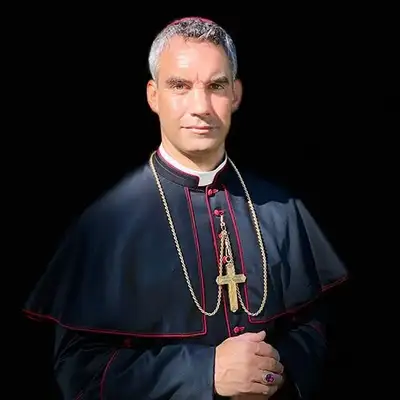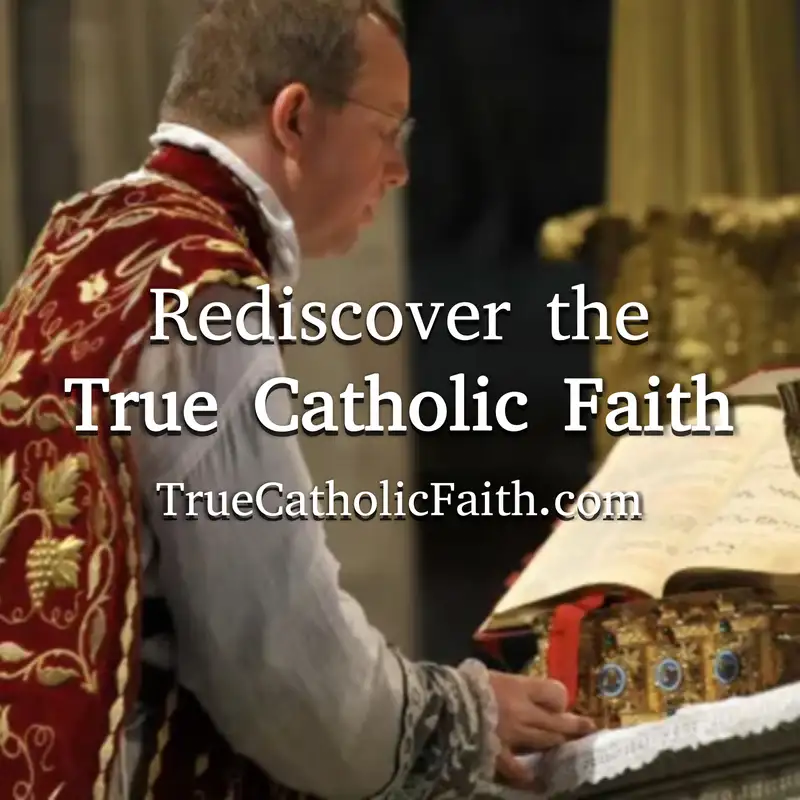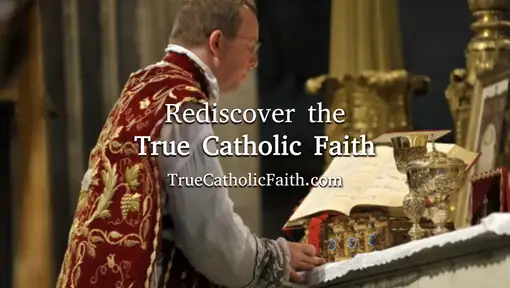Modernism - Bp. Joseph Selway 08-30-20
Download MP300:02
In the name of the Father, and of the Son, and of the Holy Ghost, amen. This week we will celebrate the feast of Saint Pius X, the great champion against modernism. The heresy he so strongly condemned in his encyclical, Paschendi. Pius X, he died on the 19th of August, 1914.
00:32
It was said that in the end, our saint died of a broken heart. As he lay on his deathbed, he looked on over the condition of the world, and what did he find? He could see the modernist creeping in stealthily from all sides into the very ranks of the church.
01:03
Infiltrating his seminaries and bringing in young modernist priests and bishops. And at the same time, as he looked on the world, he saw the pending scourge of the great war that would take the lives of some 40 million soldiers and civilians.
01:32
Already he would have received the news of the German invasion in Belgium and this invasion continuing into France and drawing all the great nations into terrible conflict. And so our saint, sadly looking on the world, realized the sad condition of men
02:04
In the fourth year of his pontificate, 1907, September the 8th, our saint declared in his encyclical, Pashendi, that the modernist had already infiltrated the church. He said, it must be confessed that these latter days have witnessed a notable increase of the enemies of the cross of Christ.
02:34
Who by arts entirely new and full of deceit are striving to destroy the vital energy of the church. The partisans of error are to be sought not only among the church's open enemies, but what is to be most dreaded and deplored in her very bosom. Pius X.
03:05
explains in the same encyclical that there have been many attempts made already to correct these modernists and to treat them kindly in order to convert them. But all attempts failing, he concludes they must be exposed for what they are.
03:32
He says, none is more skillful, none more astute than they in the employment of a thousand noxious devices, for they play the part of rationalists and Catholics.
03:59
And this so craftily they easily lead the unwary into error. So our saint is the great saint because he understood deeply the harm this heresy of modernism would inflict upon the church. And with prophetic vision,
04:24
Realize that it must be treated as the worst of all heresies, the culmination of all heresies, and therefore remove its mask and bring it out into the open as a true heresy. And so in 1907, he would expose it. He would explain that this heresy is rooted in something called agnosticism.
04:54
And this agnosticism of the modernist was especially developed by Immanuel Kant. Immanuel Kant was a German philosopher during the 18th century. And Kant taught that human reason is incapable of arriving at the notion
05:24
It is incapable of knowing God's existence and therefore incapable of ever arriving at the notion of an objective truth. In other words, we cannot pierce into this cloud of truth. We cannot pierce
05:50
Through the clouds and know that God exists, we can only know what we see. We only know appearances, similar to the animal. But beyond appearances, we really don't know that these things are true or real. And therefore God, even the existence of God, is not something we know for certain.
06:19
And so truth then becomes something subjective and something relative. And this poison St. Pius X knew would be devastating in time, in a very short time. So this agnosticism of the modernist would present
06:46
An appearance of faith and belief in the traditional teachings of the church. And you see this in the modernist. They have an appearance of profession of faith in many instances and say they do believe in the traditional teaching at the same time they deny the existence of any objective doctrinal truth.
07:16
So the modernist, by reducing faith to a subjective experience of the individual mind, turns religion into an individual experience, and therefore this differs from person to person. So every person could have his own experience of faith, his own experience of truth,
07:42
And therefore, his own expression of God and religion. And so in the end, we know this would result in ecumenism, in which there is no external revelation, no objective truth, no binding doctrines. Truth is what you believe it to be.
08:10
And so our great saint, Saint Pius X, he would warn all of us, he would warn all Catholics, that this modernist notion of religion, rooted in this personal experience with God, would lead to the destruction of the one true religion, and opens, paves the way to atheism. So thus he states in Pashendi,
08:38
Here, it is well to note at once that given this doctrine of experience of the modernist, this personal experience, every religion, even that of paganism, must be held to be true. He continues, on what grounds, therefore, can modernists deny the truth of an experience affirmed by a follower of Islam?
09:06
Will they claim a monopoly of true experiences for Catholics alone? Indeed, he says, modernists do not deny but actually maintain that all religions are true. Remember again, this is Pius X in 1907. He was already unmasking these modernists.
09:30
And we know that this modernism he condemned would blossom forth in 1962 with Vatican II and give us the new order religion. And with this prophetic vision, Pius X saw the menacing threat of modernism like a great tidal wave about to engulf the church, the entire church,
09:59
And this tidal wave would result 50 years later with Vatican II. And no Catholic living at the time of Pius X would ever have believed that we as Catholics would go from a Saint Pius X
10:23
This great saint, to the nightmare of today, in less than 100 years, from a Saint Pius X to a Bergoglio. No Catholic would believe this. Our saint was born to the Sarto family on June 2, 1835. He was born in what would be today northern Italy.
10:52
In a poor farming village, Riese, near Venice, and he was given the name of Giuseppe, Joseph. He was born to a large family. He was the second born of 10 children. His parents were very hardworking, and they made great sacrifices
11:20
To educate him, to send him to school. And Giuseppe, like his parents, was a person of simple taste, without dissimulation, without pretense, also hardworking. And he also inherited from his parents their qualities of keen judgment and good sense. And we know that grace supplied the rest.
11:50
Giuseppe, he studied Latin with his village priest for a time before the priest sent him to the seminary in which he graduated at the top of his class. And Giuseppe received holy orders finally and was successfully promoted through all of the ranks of the church. He was made a chaplain,
12:21
And then an archpriest, and then finally a canon in Treviso. And in each place, our saint was beloved by his flock. They loved him owing to his zeal and his great sacrifice, his great sacrifice for souls. They saw this in him. At the same time, he was appointed the spiritual director at the seminary in Treviso, and there he taught theology for four years.
12:53
He was then consecrated the Bishop of Mantua, and there he served for nine years until his appointment by Leo XIII as the Cardinal of Venice. And there he stayed in Venice for about ten years until he was finally elected to the pontificate, taking the name of Pius X.
13:22
Now, he took the name Pius in order to honor his great predecessor, Pius IX, who fought so bravely against the liberals defending the rights of Holy Mother Church. It is said that even as Pope, after his election, he continued his weekly catechism lessons for the children in the courtyard of the Vatican every week.
13:55
Now although our saint was as meek as a lamb teaching the children their catechism, he was the fiercest lion in his uncompromising attitude toward modernism. And in this, we must imitate our holy saint. We must imitate him
14:25
In our attitude toward modernism, remember that St. Pius X was a special pope because he was chosen by God. He was chosen by God for this time and for this age. And his vocation was to expose the heresy of modernism for what it is and to fight against it. And this was his calling and this was his vocation.
14:56
And he knew that if he did not warn the Catholic world about this poisonous heresy, that everyone would be consumed and swallowed up. He understood deeply how poison was this liberal attitude of the modernist.
15:26
And how poison was this relative theology, this agnosticism. He understood that it could take down not only the Catholic Church, it would take down all truth. All objective truth becomes relative.
15:49
In this heresy of modernism that he so strongly condemned would give us Vatican II, and with it the spirit of the modern world that we now live in. This has been passed down to us, owing to modernism. The modernism that he pointed out, the modernism that he condemned, and in this
16:15
St. Pius X knew there could be no compromise. And like our great saint, it is therefore our duty and our vocation to expose it continually for what it is and to fight against it. And this we must not do from time to time. This we must do every day. And as parents, you must do it daily.
16:46
You must daily expose it in order to protect your children and to teach them that they have this special duty to resist. And if they compromise and fail in this duty, the grace of their vocation will be taken from them and bestowed on another.
17:10
Our children must deeply, deeply understand that any compromise in this regard will cause irreparable damage to their young souls. They will be poisoned, and in the end, they will be finally blinded from ever finding again all of the spiritual gifts that God has bestowed upon them.
17:37
So let us ask God for the grace to imitate our great saint and his unflinching resolve to persevere in our resistance to Vatican II and the spirit of modernism. God bless you. In the name of the Father, and the Son, and the Holy Ghost. Amen.
Creators and Guests


